This year marks the tenth anniversary of the reunification of the Russian Orthodox Church. His Eminence Metropolitan Hilarion of Eastern America and New York, First Hierarch of the Russian Orthodox Church Outside of Russia, tells RIA Novosti about Russian churches in the diaspora, problems they face, what they expect from the future, and how Russian Orthodox communities live in America. He was interviewed by Dmitry Slodorev in Washington, DC.
—Vladyka, this year is the tenth anniversary of the reunification of the Russian Church. What have these years shown us, and what is it that we should strive for today?
—After these ten years, one gets the sense that there had never even been a rift. We feel that the body of the Church never even suffered from the division. We commune from a single chalice. I come to Russia and other republics of the former Soviet Union, and we sense fraternity and the unity of the people. We see joy, brotherly love and unity of spirit in church and social life.
The reestablishment of unity of the Church was the only right thing to do. As our regulations state, the Russian Orthodox Church Outside of Russia is an indissoluble part of the Russian Orthodox Church and claimed autonomy until the fall of the godless state. This was written during a time when a great many things hindered unification. But with Divine help, we were able to reestablish this unity.
—You have been the First Hierarch of ROCOR for almost this entire period…
—Unification occurred under Patriarch Alexy II and Metropolitan Laurus. At the time, I was the Ruling Bishop of the Diocese of Australia and New Zealand of ROCOR. Of course, we all participated in various discussions, a commission was established, and we read its documents and introduced changes.
—What are your personal recollections of that time?
—I came to Russia in 2003 or 2004 as a delegate of an official group, when Archbishop Mark of Berlin and Germany, Archbishop Kyrill of San Francisco and Western America and I were invited to meet with His Holiness Patirarch Alexy and the Holy Synod of the Russian Orthodox Church. It was a remarkable meeting. We met then Metropolitan, now Patriarch, Kirill. I have fond memories of that trip. We spent a long time in a private discussion with Patriarch Alexy, and it was already decided that we should have negotiations on reunification. A special committee comprised of clergymen was then formed. Step by step, we reached the events of 2007.
—What has changed in the Russian Church Abroad over these last ten years? How has ROCOR itself changed?
—I think she has remained the same, but it’s as though she has taken a deep breath and feels enriched through her communion with the entire Russian Orthodox Church. Church life abroad continues, though. Our parishes are being reborn, many Russians, Ukrainians and other nationalities are coming to our parishes. New communities are being established. All this is a result of reunification. Many people in the past were afraid of coming to our churches.
—In November-December, the Council of Bishops of the Russian Orthodox Church will convene, in which you will participate. What are your expectations, and what issues do you hope to raise there?
—We haven’t discussed this yet. There are questions that are always raised—how to draw more people to church for fuller church life in Russia and in other nations. This is an ongoing process. There are pre-Council discussions being held now, in which all participants can raise questions.
—A year and a half has elapsed since the meeting between Patriarch Kirill and the Pope. Has this done anything to bring the two churches together, or contributed towards cooperation?
—I don’t think anything has changed. From the point of view of Orthodox Christianity, this would be impossible unless the Catholic Church rejects some of its dogmas. Relations have existed for decades, and no one has budged. The Catholics don’t deny the teaching that the Roman Pope is the head of the Church, that he is infallible in his teachings. They have not rejected many other teachings that are unacceptable to us. That is why Patriarch Kirill’s meeting with Pope Francis was devoted to social issues. His Holiness the Patriarch has indicated many times that in light of today’s moral falling in the world, all Christian churches should fight together and defend Christian values. Unfortunately, this does not always succeed. So I think that the Patriarch was not considering unification with the Catholics, simply dealing with moral issues facing the world.
—Did this succeed?
—That meeting was not planned, and many in Russia and abroad expressed concern. I think this is fading now, but some people are still talking about it.
—How is life for the Russian Church Abroad in America today? Russian-US relations are, to put it mildly, not the best now. You are Russians, but also Americans. How are you able to live “between two fires?”
—We regret that Russia is represented so badly in the USA. The story of Russian participation in the US elections are of course a fiction. But such stories don’t reflect on our life here. We don’t sense any pressure or persecution from the American government. Simple Americans have always been good people—we don’t sense animosity from everyday Americans. This is all just on TV; there are people who are promoting their political or national interests. But that’s their problem.
—Most of your parishioners are probably Americans anyway…
—No, we have a great many Russians. Thank God, there are many Americans, too, who, being members of part of the Russian Church, understand the Russian spirit and recognize that we have no politics, only the desire for spiritual salvation.
—What do you think about the story of a group of people hurling anti-Russian epithets near Holy Trinity Monastery in Jordanville, NY?
—These are locals who went hunting near the monastery. The monastery made them stop, and they got mad and started lashing out. Of course, this is unsettling for the monastery. At two to three in the morning, when the monks are asleep, they make noise. But there have been such instances in the past, too, because some neighbors didn’t grasp who these monks are, what kind of church is this. Someone smashed headstones in the cemetery. But these are just individuals, I wouldn’t call it a movement of any sort.
—How can this problem be solved? This is after all the main monastery of the Russian Church Abroad.
—The rest of the locals have a normal relationship with the monastery. We’re talking about some hooligans; the police need to deal with them.
—Are any new saints going to be canonized in the Russian Church Abroad?
—Nothing is planned.
—At the end of October is the 20th anniversary of the murder of Jose Munoz-Cortes, the caretaker of the Myrrh-Streaming “Montreal” Icon of the Mother of God. The Eastern American Diocese has appointed a committee to gather witness accounts towards his canonization...
—This is a diocesan committee, which will turn over its findings to a Synodal commission. So far, the Synod of Bishops has not decided to canonize anyone. Time must pass to gather information and study the matter.
—How far are we from seeing the canonization of Brother Jose?
—It's hard to say. It all depends on the Synod. Each of its members has an opinion, and they have to reach a unanimous conclusion. The Synod is against hurrying to make any decision. Even St. John of Shanghai and San Francisco was canonized a long time, more than 20 years, after his death.
—What church events are planned for the twentieth anniversary of Brother Jose?
—The main event will be a pilgrimage at the end of October to his gravesite at Holy Trinity Monastery in Jordanville, NY. People from all over the US and Canada are expected, and the Myrrh-Streaming “Hawaiian” Iveron Icon of the Mother of God will be there.
I knew Br Jose well. The Lord gave him a remarkable obedience, to take care of the Myrrh-Streaming “Montreal” Iveron Icon of the Mother of God. He spent many years taking it throughout Russian parishes across the globe. He fulfilled this difficult task with love and patience. The Lord allowed him a martyr’s death. And the holy icon disappeared.
Thank God, the “Hawaiian” Icon has now appeared. We see how its caretaker, Brother Nektarios Yangson, is happy to have this spiritual obedience, the opportunity to visit Orthodox parishes and meet with its parishioners.
—Vladyka, you have not only Russian but Ukrainian blood. What is your opinion of events in Ukraine today, including Church affairs? Recently, President Petro Poroshenko appealed to His Holiness Patriarch Bartholomew of Constantinople with a request to unite the Ukrianian Orthodox Church into one. Would this be possible?
—This represents another attempt to create an autocephalous church in Ukraine. This is a political effort, and Patriarch Bartholomew has already assured Patriarch Kirill of Moscow and All Russia that he does not recognize schismatics. The so-called “Kievan Patriarchate” is now seizing our churches. It is very sad that this could even take place, and that the government of Ukraine is meddling in Church matters.
—We began our discussion with the tenth anniversary of the reunification of the Russian Church. What do you expect to see in the next 10 years?
—I hope that they are peaceful and that the Church flourishes. We see that the Church, especially in Russia, is seeing more young people attend divine services. The people who lived in the former Soviet Union did not have a spiritual education, but gradually, as they attend church, they are being strengthened in their faith. Life in the parishes both in Russia and abroad is gaining new life. People understand why they go to church, and what it means for their eternal salvation. It is important for this to continue.

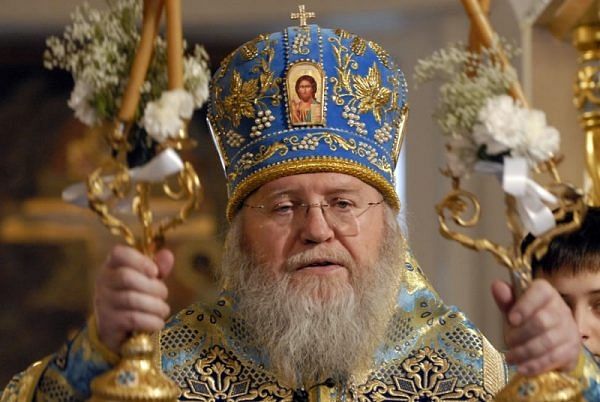
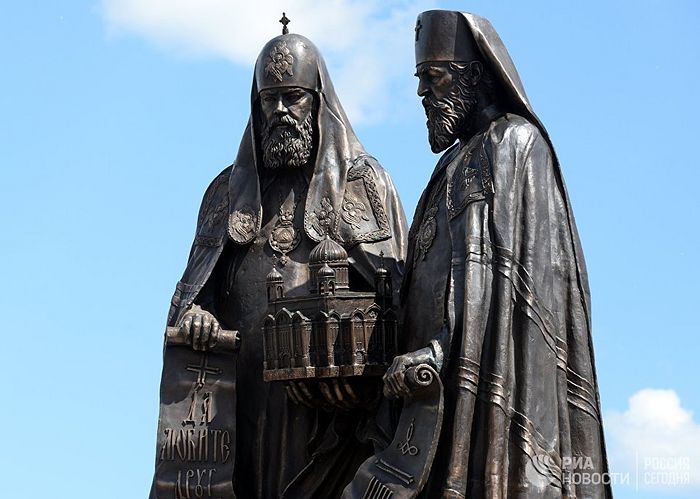
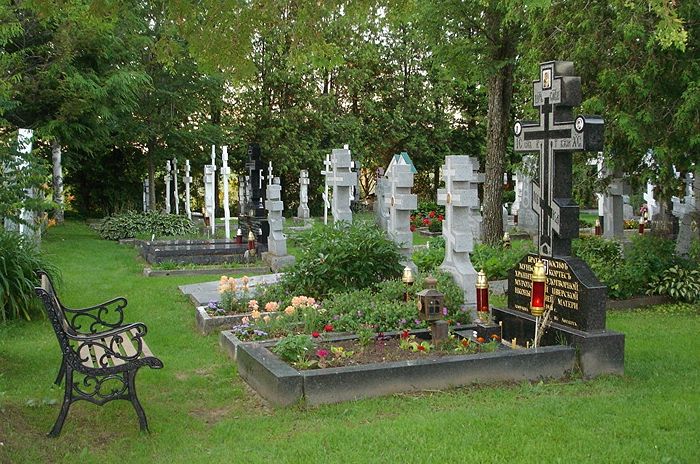
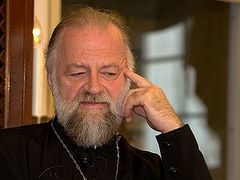
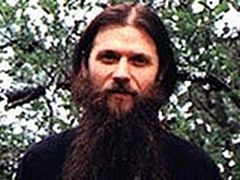
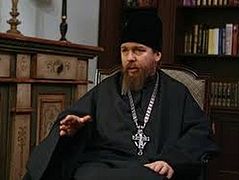
No, It's all of our problem. The same nutjobs will be starting a nuclear war one of these days and we will all be toast. As usual. Nothing ever good ever comes from the west. Killers of people.